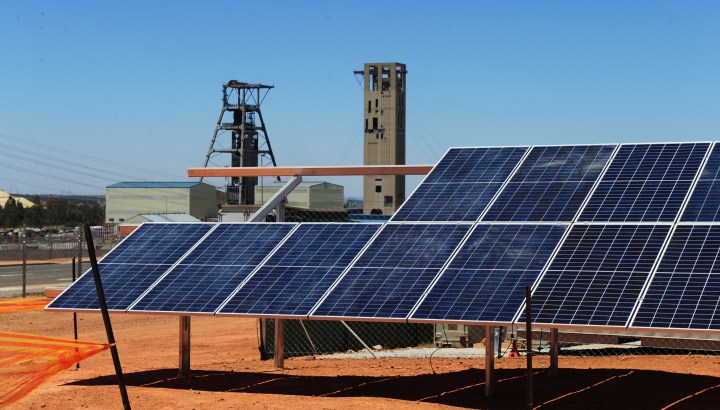GREEN TRANSITION?
Procurement mafia targets Gold Fields’s new solar power station project

South Africa’s green transition may be a red rag for criminal enterprises.
A reconfigured drilling rig drives a rectangular metal pole into the ground, producing a metallic sound that rings across the veld. These poles are the building blocks of a R660-million, 40MW solar power station that will provide electricity to Gold Fields’s South Deep mine southwest of Johannesburg.
This is the first self-generation project of this scale – before the 100MW bar was introduced – to be granted regulatory approval in South Africa’s mining industry. DM168 can exclusively report that it has attracted the attention of the “procurement mafia”, which industry sources say has moved from targeting construction projects to attempts to shake down the mining industry.
Gold Fields says it is drawing a line in the sand and will not be intimidated, echoing a broader industry pushback against this attempt to muscle into procurement contracts and revenue.
“We can confirm that several of our senior managers have been approached anonymously by email and WhatsApp, often with threatening demands for procurement contracts in two current ongoing projects, including the South Deep 40MW solar plant. These approaches have come at the same time as business forums have sprung up, similarly demanding favourable procurement opportunities,” Martin Preece, executive vice-president South Africa at Gold Fields, told DM168.
“We have stringent and transparent procurement processes in place, underpinned by a firm commitment to sound governance and ethical business practices. Diverting from this is at odds with who we are as a business and will put us on a dangerous trajectory leading to the hollowing out of our business,” Preece said.
“Hollowing out” has been used to describe the fate that befell South African SOEs during State Capture under former president Jacob Zuma. But hollowing out state organs – under the cover of opaque political networks from within for the sake of extraction and patronage – is one thing. Coming at publicly listed companies with secondary listings in the US is another.
Global companies such as Gold Fields, which are scrutinised by bodies such as the US Securities and Exchange Commission (SEC) and fund managers both foreign and domestic, cannot easily yield to mob pressure. A fund manager in Boston can try to assess the risk associated with, say, policy uncertainty. But a plain racket making “threatening demands” for a cut of your contracts? That’s beyond the pale. With environmental, social and governance issues taking centre stage in boardrooms, such strong-arm tactics are hardly going to fly.
Take, for example, Rio Tinto’s decision to suspend its Richards Bay Minerals operation after the assassination of general manager Nico Swart. Boardrooms react to blatant criminal menace. It highlights the risks of doing business in SA and the consequences of a failing state. To say it’s bad for investment is an understatement.
“We take these approaches very seriously and continuously assess the risk to our people and the business. We also keep the local SA Police [Service] informed and are working through the Minerals Council SA to deal with the wider issues of violent crime confronting the mining sector in the country,” Preece said.
Of canaries and vultures
This attempt at twisting Gold Fields’s arm is like the canary in the coal mine when SA is making its first serious efforts to reduce its coal usage against the backdrop of the UN COP26 in Glasgow. SA mining companies have a rich pipeline of renewable power projects to reduce their reliance on Eskom and meet increasingly ambitious decarbonisation targets. Roger Baxter, CEO of the Minerals Council, has said that the mining industry is ready to build 2GW of renewable energy to the tune of between R30- and R40-billion.
On top of that tempting pie is the $8.5-billion deal struck in Glasgow with developed economies to finance South Africa’s “just energy transition”.
Planned industry projects and Glasgow financing is over R150-billion – a figure that is just too big for South Africa’s criminals and corrupt cadres to ignore. A Russian nuclear deal may be a pipe dream, but here is real money and projects. South Africa has an abundance of sunshine and wind to drive a switch to clean energy. But it is cursed with scavengers flocking to the decaying remains of a body politic rotting under that solar glare.
And these scavengers can tap into a swelling vein of social discontent that is the consequence of sluggish economic growth, sky-high unemployment, rising poverty, shoddy policing and the state’s failure to provide basic services. The recent local government elections were testimony to this monumental failure. This is where the roots of “community protests” lie that mining executives say are ginned up by the thugs wanting a piece of the procurement action.
“It’s illegal behaviour whereby groupings of people, including possibly business people, are mobilising communities against mines on a day-by-day basis in an attempt to leverage by almost [forcing] some sort [of] response into procurement,” Paul Dunne, the CEO of Northam Platinum and vice-president of the Minerals Council, told DM168 recently. He said there were several elements to it.
“There is the criminal behaviour by business people, and this is very wrong and will not be tolerated by mining companies. If we give in to this kind of pressure, we are in for a hiding second to none. So we will resist it with everything that we’ve got.
“There is another dynamic to consider. How are the business people able to mobilise the communities? It’s because there is a dearth of economic opportunities. So it’s an easy mobilisation.
“People want jobs, and they haven’t got service delivery from government – power, water, roads, clinics, schools, you name it. We are operating in some of the most impoverished parts of the country. That’s fertile ground for mobilising genuinely unhappy people.”
Dunne said “all mining companies have experienced it”, and he was speaking from experience.
Northam’s Booysendal mine, in the rural hinterland on the Limpopo and Mpumalanga border, has only two access points. “It is very easy if someone wanted to block the road, and that happens from time to time whereby a truck might be hijacked and jack-knifed across the road or burnt. If you do that at the critical point in time in the mining shift, you will effectively stop the mining shift because people simply can’t get to work,” he said.
“Some of it is related to attempts to leverage the mine management to award particular contracts to particular groupings. We will not tolerate that. I want to make that very clear.”
Gold Fields is also sending this message about its solar plant project in the impoverished west of Gauteng. Security and mining sources say these mafias started in the construction sector and moved into mining. Hardly any new mines are being built, so the looming renewable build binge is the next big target, bringing mining and construction neatly together.
Security sources who alerted DM168 to the moves on Gold Fields say renewable and other environmental projects such as tailings dams are high on the radar of such elements. It is important not to dismiss the legitimate grievances that local communities in South Africa have with the mining sector. Rooted in the apartheid past and hardened by subsequent governance failures, these can play out, notably in former homelands, where mining companies have cut deals with traditional authorities that have left local populations high and dry.
But shady operators can take advantage of these situations, and it can be difficult in the murk to hear the community’s understandable cries among the criminalised chaos.
Gold Fields says that, while shady business people may claim to speak for the “community”, it is doing its bit. “Many of the spurious business organisations and individuals, which claim to represent local communities, and to speak on their behalf, are, on the contrary, not from our host communities and are representing narrow personal interests,” Preece said.
“Our efforts have been focused on creating real value for our nine host communities, who are located in the vicinity of the mine. We believe that by creating jobs and investing in these communities we can make a real, positive difference to our communities.”
The company says that two-thirds of South Deep’s employees and contractors hail from its host or nearby communities, and 25% of its procurement spend in 2020 came from these sources. That may not seem like much, but South Deep is a mechanised operation extracting gold from 3km below the surface. That requires costly and sophisticated technical equipment that, sadly, is not manufactured on the West Rand. The company says its solar project will draw on the local workforce, and female-owned companies are in line to score contracts, which are tendered on its website.
Meanwhile, the sun shines on the Republic, and the wind blows. This should be a magnet for investment and upliftment, not to mention the environmental and climate pay-offs, which is what the drive to renewables is ultimately all about. But the vultures are circling in the updraft, and the canaries down below are chirping. DM168
This story first appeared in our weekly Daily Maverick 168 newspaper which is available for R25 at Pick n Pay, Exclusive Books and airport bookstores. For your nearest stockist, please click here.


















 Become an Insider
Become an Insider
Mindblowing. Our mines are a significant contributor to GDP and recent bumper commodity prices led to much needed tax windfalls. Any shrinkage in this sector spells disaster of epic proportions for all South Africans. These miscreants will sabotage our economy for self gain…and our leaders are watching the passing parade…
Just how do we purge this rot that has seeped into every area of our country?
May I ask where the SAPS is in all of this?
So where are Celes Cops? Still chasing people on beaches without masks?
It’s really difficult to do business in a sea of poverty. This one is on the ANC.
stick to your guns mining sector. some of the construction industry capitulated to these thugs. it cannot be allowed in the mining and supply chain.
Don’t be surprised if it is driven by the vultures in ruling party who had BOSASA (and other sources) until recently to fund their criminal enterprise. Now Mantashe continues punting gas fired ships – to sail off into the sunset … of our continued demise? As for SAPS … if the recent findings against the ‘head’ of that corrupt enterprise is anything to go by … we are clutching at straws ! Not sure if any of the ‘recommendations’ that are to be released soon by Zondo, will even cover any of these endless shenanigans. And even if they do, will the ruling party (and its factionalism) pay any attention to them, given that they rely on this criminality for their survival. Maybe that motley assortment of ‘military veterans’ can be relied upon to carry out a military coup !
These mafia organizations started with the big construction companies mainly at Richards Bay- surely these big mining companies have access not only to intelligence, but also armed services, NOT governmental? If these criminals are not stopped now , they will proliferate, invading industry, as well as mining and construction. They rely on instilling fear, on intimidation, and must be met with the requisite force. Leave SAPS out!
Reading this gave me a knot in my stomach.
I’m not overly religious but I hope & pray you guys can overcome this mafia. Protect your employees with all that is available.
How sad. When I heard about the Glasgow financing of R150 Billion, my first thought was not elation as it should have been but rather, I’m sure the cadres are already plotting how they can get their grubby paws on the mula. Sadly I was right.